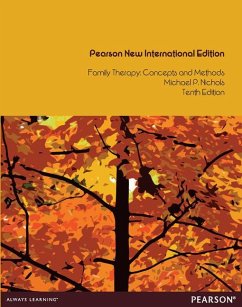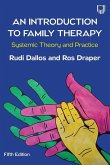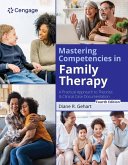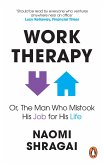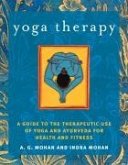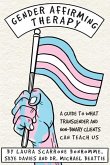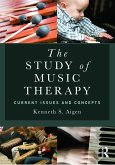THE definitive classic text in the field of Family Therapy
Family Therapy: Concepts & Methods describes and analyzes the field of family therapy, covering its history, schools, and developments. Numerous case studies throughout the text help students understand the link between history, theory, and practice.
Learning Goals
Upon completing this book, readers will be able to:
Describe clinical approaches
Understand old and new developments in the field of family therapy
Analyze successes and failures in research, and the impact on current clinical practices
Compare different schools of family therapy and explain the contemporary status of distinct schools of therapy
Features + Benefits
Engaging and accessible writing style
Numerous tables and figures to present the very latest research and data
Heavy concentration on clinical practice
Relevant examples to everyday experiences
Includes analysis of current status of each school of family therapy
Description and analysis of latest trends (integrative models and new approaches)
Discusses the complexity of conducting meaningful research, its limiting impact on practice, and increasing the relevance of empirical research for clinical practice
Create a Custom Text: For enrollments of at least 25, create your own textbook by combining chapters from best-selling Pearson textbooks and/or reading selections in the sequence you want. To begin building your custom text, visit www.pearsoncustomlibrary.com. You may also work with a dedicated Pearson Custom editor to create your ideal text—publishing your own original content or mixing and matching Pearson content. Contact your Pearson Publisher’s Representative to get started.
IN THIS SECTION:
1.) BRIEF TABLE OF CONTENTS
2.) FULL TABLE OF CONTENTS
1. BRIEF TABLE OF CONTENTS
PART ONE THE CONTEXT OF FAMILY THERAPY
Chapter 1 The Evolution of Family Therapy
Chapter 2 Basic Techniques of Family Therapy
Chapter 3 The Fundamental Concepts of Family Therapy Cybernetics
PART TWO THE CLASSIC SCHOOLS OF FAMILY THERAPY
Chapter 4 Bowen Family Systems Therapy
Chapter 5 Strategic Family Therapy
Chapter 6 Structural Family Therapy
Chapter 7 Experimental Family Therapy
Chapter 8 Psychoanalytic Family Therapy
Chapter 9 Cognitive-Behavioral Family Therapy
Chapter 10 Family Therapy in the Twenty-First Century
PART THREE RECENT DEVELOPMENTS IN FAMILY THERAPY
Chapter 11 Solution-focused Therapy
Chapter 12 Narrative Therapy
Chapter 13 Comparative Analysis
Chapter 14 Research on Family Intervention
2. FULL TABLE OF CONTENTS
PART ONE The Context of Family Therapy
Introduction The Foundations of Family Therapy
The Myth of the Hero
Psychotherapeutic Sanctuary
Family versus Individual Therapy
Psychology and Social Context
Thinking in Lines, Thinking in Circles
The Power of Family Therapy
Recommended Readings
Chapter 1: The Evolution of Family Therapy
The Undeclared War
Small Group Dynamics
The Child Guidance Movement
Research on Family Dynamics and the Etiology of Schizophrenia
Gregory Bateson–Palo Alto
Theodore Lidz–Yale
Lyman Wynne–National Institute of Mental Health
Role Theorists
Marriage Counseling
From Research to Treatment: The Pioneers of Family Therapy
John Bell
Palo Alto
Murray Bowen
Nathan Ackerman
Carl Whitaker
Ivan Boszormenyi-Nagy
Salvador Minuchin
Other Early Centers of Family Therapy
The Golden Age of Family Therapy
Summary
Recommended Readings
References
Chapter 2: Basic Techniques of Family Therapy
Getting Started
The Initial Telephone Call
The First Interview
The Early Phase of Treatment
The Middle Phase of Treatment
Termination
Family Assessment
The Presenting Problem
Understanding the Referral Route
Identifying the Systemic Context
Stage of the Life Cycle
Family Structure
Communication
Drug and Alcohol Abuse
Domestic Violence and Child Abuse
Extramarital Affairs
Gender
Culture
The Ethical Dimension
Family Therapy with Specific Presenting Problems
Marital Violence
Sexual Abuse of Children
Working with Managed Care
Summary
Recommended Readings
References
Chapter 3: The Fundamental Concepts of Family Therapy Cybernetics
Systems Theory
General Systems Theory
Social Constructionism
Constructivism
Attachment Theory
Conclusions
The Working Concepts of Family Therapy
Interpersonal Context
Complementarity
Circular Causality
Triangles
Process/Content
Family Structure
Family Life Cycle
Resistance
Family Narratives
Gender
Culture
Summary
Recommended Readings
References
PART TWO The Classic Schools of Family Therapy
Chapter 4: Bowen Family Systems Therapy
Sketches of Leading Figures
Theoretical Formulations
Differentiation of Self
Emotional Triangles
Multigenerational Emotional Processes
Sibling Position
Emotional Cutoff
Societal Emotional Process
Normal Family Development
Development of Behavior Disorders
Goals of Therapy
Conditions for Behavior Change
Therapy
Assessment
Therapeutic Techniques
Evaluating Therapy Theory and Results
Summary
Recommended Readings
References
Chapter 5: Strategic Family Therapy
Sketches of Leading Figures
Theoretical Formulations
Normal Family Development
Development of Behavior Disorders
Goals of Therapy
Conditions for Behavior Change
Therapy
Assessment
Therapeutic Techniques
Evaluating Therapy Theory and Results
Summary
Recommended Readings
References
Chapter 6: Structural Family Therapy
Sketches of Leading Figures
Theoretical Formulations
Normal Family Development
Development of Behavior Disorders
Goals of Therapy
Conditions for Behavior Change
Therapy
Assessment
Therapeutic Techniques
Evaluating Therapy Theory and Results
Summary
Recommended Readings
References
Chapter 7: Experimental Family Therapy
Sketches of Leading Figures
Theoretical Formulations
Normal Family Development
Development of Behavior Disorders
Goals of Therapy
Conditions for Behavior Change
Therapy
Assessment
Therapeutic Techniques
Evaluating Therapy Theory and Results
Summary
Recommended Readings
References
Chapter 8: Psychoanalytic Family Therapy
Sketches of Leading Figures
Theoretical Formulations
Freudian Drive Psychology
Self Psychology
Object Relations Theory
Normal Family Development
Development of Behavior Disorders
Goals of Therapy
Conditions for Behavior Change
Therapy
Assessment
Evaluating Therapy Theory and Results
Summary
Recommended Readings
References
Chapter 9: Cognitive-Behavioral Family Therapy
Sketches of Leading Figures
Theoretical Formulations
Normal Family Development
Development of Behavior Disorders
Goals of Therapy
Conditions for Behavior Change
Therapy
Behavioral Parent Training
Behavioral Couples Therapy
The Cognitive-Behavioral Approach to Family Therapy
Treatment of Sexual Dysfunction
Eval
THE definitive classic text in the field of Family Therapy Family Therapy: Concepts & Methods describes and analyzes the field of family therapy, covering its history, schools, and developments. Numerous case studies throughout the text help students understand the link between history, theory, and practice. Learning Goals Upon completing this book, readers will be able to: * Describe clinical approaches * Understand old and new developments in the field of family therapy * Analyze successes and failures in research, and the impact on current clinical practices * Compare different schools of family therapy and explain the contemporary status of distinct schools of therapy
Hinweis: Dieser Artikel kann nur an eine deutsche Lieferadresse ausgeliefert werden.
Family Therapy: Concepts & Methods describes and analyzes the field of family therapy, covering its history, schools, and developments. Numerous case studies throughout the text help students understand the link between history, theory, and practice.
Learning Goals
Upon completing this book, readers will be able to:
Describe clinical approaches
Understand old and new developments in the field of family therapy
Analyze successes and failures in research, and the impact on current clinical practices
Compare different schools of family therapy and explain the contemporary status of distinct schools of therapy
Features + Benefits
Engaging and accessible writing style
Numerous tables and figures to present the very latest research and data
Heavy concentration on clinical practice
Relevant examples to everyday experiences
Includes analysis of current status of each school of family therapy
Description and analysis of latest trends (integrative models and new approaches)
Discusses the complexity of conducting meaningful research, its limiting impact on practice, and increasing the relevance of empirical research for clinical practice
Create a Custom Text: For enrollments of at least 25, create your own textbook by combining chapters from best-selling Pearson textbooks and/or reading selections in the sequence you want. To begin building your custom text, visit www.pearsoncustomlibrary.com. You may also work with a dedicated Pearson Custom editor to create your ideal text—publishing your own original content or mixing and matching Pearson content. Contact your Pearson Publisher’s Representative to get started.
IN THIS SECTION:
1.) BRIEF TABLE OF CONTENTS
2.) FULL TABLE OF CONTENTS
1. BRIEF TABLE OF CONTENTS
PART ONE THE CONTEXT OF FAMILY THERAPY
Chapter 1 The Evolution of Family Therapy
Chapter 2 Basic Techniques of Family Therapy
Chapter 3 The Fundamental Concepts of Family Therapy Cybernetics
PART TWO THE CLASSIC SCHOOLS OF FAMILY THERAPY
Chapter 4 Bowen Family Systems Therapy
Chapter 5 Strategic Family Therapy
Chapter 6 Structural Family Therapy
Chapter 7 Experimental Family Therapy
Chapter 8 Psychoanalytic Family Therapy
Chapter 9 Cognitive-Behavioral Family Therapy
Chapter 10 Family Therapy in the Twenty-First Century
PART THREE RECENT DEVELOPMENTS IN FAMILY THERAPY
Chapter 11 Solution-focused Therapy
Chapter 12 Narrative Therapy
Chapter 13 Comparative Analysis
Chapter 14 Research on Family Intervention
2. FULL TABLE OF CONTENTS
PART ONE The Context of Family Therapy
Introduction The Foundations of Family Therapy
The Myth of the Hero
Psychotherapeutic Sanctuary
Family versus Individual Therapy
Psychology and Social Context
Thinking in Lines, Thinking in Circles
The Power of Family Therapy
Recommended Readings
Chapter 1: The Evolution of Family Therapy
The Undeclared War
Small Group Dynamics
The Child Guidance Movement
Research on Family Dynamics and the Etiology of Schizophrenia
Gregory Bateson–Palo Alto
Theodore Lidz–Yale
Lyman Wynne–National Institute of Mental Health
Role Theorists
Marriage Counseling
From Research to Treatment: The Pioneers of Family Therapy
John Bell
Palo Alto
Murray Bowen
Nathan Ackerman
Carl Whitaker
Ivan Boszormenyi-Nagy
Salvador Minuchin
Other Early Centers of Family Therapy
The Golden Age of Family Therapy
Summary
Recommended Readings
References
Chapter 2: Basic Techniques of Family Therapy
Getting Started
The Initial Telephone Call
The First Interview
The Early Phase of Treatment
The Middle Phase of Treatment
Termination
Family Assessment
The Presenting Problem
Understanding the Referral Route
Identifying the Systemic Context
Stage of the Life Cycle
Family Structure
Communication
Drug and Alcohol Abuse
Domestic Violence and Child Abuse
Extramarital Affairs
Gender
Culture
The Ethical Dimension
Family Therapy with Specific Presenting Problems
Marital Violence
Sexual Abuse of Children
Working with Managed Care
Summary
Recommended Readings
References
Chapter 3: The Fundamental Concepts of Family Therapy Cybernetics
Systems Theory
General Systems Theory
Social Constructionism
Constructivism
Attachment Theory
Conclusions
The Working Concepts of Family Therapy
Interpersonal Context
Complementarity
Circular Causality
Triangles
Process/Content
Family Structure
Family Life Cycle
Resistance
Family Narratives
Gender
Culture
Summary
Recommended Readings
References
PART TWO The Classic Schools of Family Therapy
Chapter 4: Bowen Family Systems Therapy
Sketches of Leading Figures
Theoretical Formulations
Differentiation of Self
Emotional Triangles
Multigenerational Emotional Processes
Sibling Position
Emotional Cutoff
Societal Emotional Process
Normal Family Development
Development of Behavior Disorders
Goals of Therapy
Conditions for Behavior Change
Therapy
Assessment
Therapeutic Techniques
Evaluating Therapy Theory and Results
Summary
Recommended Readings
References
Chapter 5: Strategic Family Therapy
Sketches of Leading Figures
Theoretical Formulations
Normal Family Development
Development of Behavior Disorders
Goals of Therapy
Conditions for Behavior Change
Therapy
Assessment
Therapeutic Techniques
Evaluating Therapy Theory and Results
Summary
Recommended Readings
References
Chapter 6: Structural Family Therapy
Sketches of Leading Figures
Theoretical Formulations
Normal Family Development
Development of Behavior Disorders
Goals of Therapy
Conditions for Behavior Change
Therapy
Assessment
Therapeutic Techniques
Evaluating Therapy Theory and Results
Summary
Recommended Readings
References
Chapter 7: Experimental Family Therapy
Sketches of Leading Figures
Theoretical Formulations
Normal Family Development
Development of Behavior Disorders
Goals of Therapy
Conditions for Behavior Change
Therapy
Assessment
Therapeutic Techniques
Evaluating Therapy Theory and Results
Summary
Recommended Readings
References
Chapter 8: Psychoanalytic Family Therapy
Sketches of Leading Figures
Theoretical Formulations
Freudian Drive Psychology
Self Psychology
Object Relations Theory
Normal Family Development
Development of Behavior Disorders
Goals of Therapy
Conditions for Behavior Change
Therapy
Assessment
Evaluating Therapy Theory and Results
Summary
Recommended Readings
References
Chapter 9: Cognitive-Behavioral Family Therapy
Sketches of Leading Figures
Theoretical Formulations
Normal Family Development
Development of Behavior Disorders
Goals of Therapy
Conditions for Behavior Change
Therapy
Behavioral Parent Training
Behavioral Couples Therapy
The Cognitive-Behavioral Approach to Family Therapy
Treatment of Sexual Dysfunction
Eval
THE definitive classic text in the field of Family Therapy Family Therapy: Concepts & Methods describes and analyzes the field of family therapy, covering its history, schools, and developments. Numerous case studies throughout the text help students understand the link between history, theory, and practice. Learning Goals Upon completing this book, readers will be able to: * Describe clinical approaches * Understand old and new developments in the field of family therapy * Analyze successes and failures in research, and the impact on current clinical practices * Compare different schools of family therapy and explain the contemporary status of distinct schools of therapy
Hinweis: Dieser Artikel kann nur an eine deutsche Lieferadresse ausgeliefert werden.

